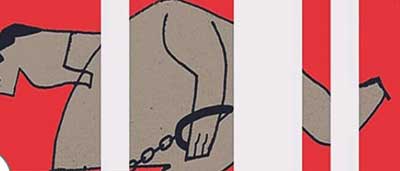Relevance: GS-2: Mechanisms, Laws, Institutions and Bodies constituted for the Protection and Betterment of these Vulnerable Sections.
Key Phrases: Crime and Criminal Tracking Networks and System, Criminal Procedure (Identification) Bill, Technological and scientific advancements, Seventh Schedule, Chilling Effect, Self-incrimination.
Why in News?
- On March 28, the government introduced the Criminal Procedure (Identification) Bill in the Lok Sabha, seeking to replace the Identification of Prisoners Act, 1920 which regulates how the police can gather data from convicted or suspected criminals. The Bill exemplifies the current trend to pass laws that are filled with ambiguity and lack safeguards. It also reflects a desire to expand the power of the government to interfere in the lives of citizens.
Some Provisions of Criminal Procedure (Identification) Bill:
- Power to police: The bill allows police and prison authorities to
legally collect, store and analyse physical and biological samples including
retina and iris scans of those convicted.
- The record of measurements will be retained for a period of 75 years from the date of collection, according to the bill.
- Collection of sensitive data: The bill proposes a legal collection of behavioural attributes including signatures, handwriting, or any other examination referred under Section 53 or Section 53A of CrPC of the convicts.
- Legalization: As per the legislation, if there is any resistance from the convicts to taking the measurements, it will be termed as an offence under Section 186 of the IPC (obstructing public servant) - leading to a jail term of three months, or a fine of ₹500 or both.
- Exemptions: The government has also clarified that people who are not convicted or arrested for crimes against women or children, or those people who are in custody for an offence that is punishable for less than seven years, can refuse to give their biological samples.

Need of the law:
- Present age-old laws – not suitable: The present prisoner identification law is a century old and perhaps not appropriately rigorous for the present day, considering the array of technological and scientific advancements that have transformed crime and law enforcement since 1920.
- To speed up the investigation process: The bill will not only help our investigation agencies but also increase prosecution. There is also a chance of an increase in conviction rate in courts through this
- Success of such previous attempts: The Crime and Criminal Tracking Networks and System (CCTNS) project, for example, set up by P Chidambaram in 2009 under the UPA government, played a significant role in modernising Indian policing.
Crime & Criminal Tracking Network and Systems:
The Crime and Criminal Tracking Network Systems (CCTNS) was conceptualized by the Ministry of Home Affairs in detailed consultation with all stakeholders and is being implemented as a "Mission Mode Project (MMP)" since 2009.
- The scope of CCTNS spans all 35 States and Union Territories and covers all Police Stations (15,000+ in number) and all Higher Police Offices (6,000+ in number) in the country.
- The CCTNS project includes vertical connectivity of police units (linking police units at various levels within the States - police stations, district police offices, state headquarters, SCRB and other police formations as well as horizontal connectivity, linking police functions at State and Central level to external entities.
Objectives of CCTNS:
- Provide Citizen Centric Police Services via a web portal
- Pan India search on National database of Crime & Criminal records
- Crime and Criminal reports at State and Center
- Computerization of Police Processes
Issues with Criminal Procedure (Identification) Bill:
- Infringement of federal structure: Rule-making power in this
arena, currently vested only in state governments, would be extended to the
central government.
- As per Seventh Schedule, 'Police' and 'Public Order' are State subjects under the Constitution.
- Ambiguity in the Bill: Bill extends this wanton collection of data not only to all convicts, but also to anyone who is arrested or detained, and even people who are merely “suspected” of committing a crime or are deemed “likely” to do so.
- Chilling effect of Bill: It demonstrates a crippling fear of
dissent and a willingness to wage open warfare against the opposition of the
state. If the Bill were enacted, nothing would stop the police from, say,
detaining protestors and collecting their personal data to use against them
at a later date.
- For example: In the past, such method has been used notably against crowds who were peacefully protesting the Citizenship Amendment Act in Delhi and Uttar Pradesh in 2019-20,
- Violation of the Privacy: Supreme Court’s Puttaswamy decision in
2017 established privacy as a fundamental constitutional right, following
which a committee chaired by Justice B N Srikrishna to deliberate on a law
to protect privacy.
- The new Bill now includes “national security” as one of its objectives – and this is one of the reasons why privacy has been so diluted.
- Justice Srikrishna pointed out that the Bill allows the Centre to exempt any of its agencies from the provisions supposed to protect privacy – in the name of security.
- The GoI’s casual approach was most recently exemplified by numerous failures of the Aarogya Setu contact-tracing app.
- A draconian and against civil liberties bill: As it violates
clauses of the Constitution that protect life and personal liberty and
guard against self-incrimination. Clause 3 of Article 20 of the
Indian Constitution reads, "No person accused of any offence shall be
compelled to be a witness against himself."
- The Internet Freedom Foundation noted its “extreme concern” and urged Parliament to refer the Bill to a standing committee.
- The opposition argued that the bill could “convert India into a police state and could be used to settle political scores”.
Conclusion:
- The sweeping and accountability-free Bill ends up making the cure far worse than the symptom. The government’s tendency to target protestors and political opponents using surveillance techniques means that the danger this Bill poses is simply too great. Therefore, there is a need for legislative impact assessment and a well-structured data protection system before implementation of the bill.
Sources: Indian Express Economic-Times
Mains Question:
Q. Discuss the provisions and concerns with regards to the recently introduced The Criminal Procedure (Identification) Bill? [250 words].



















